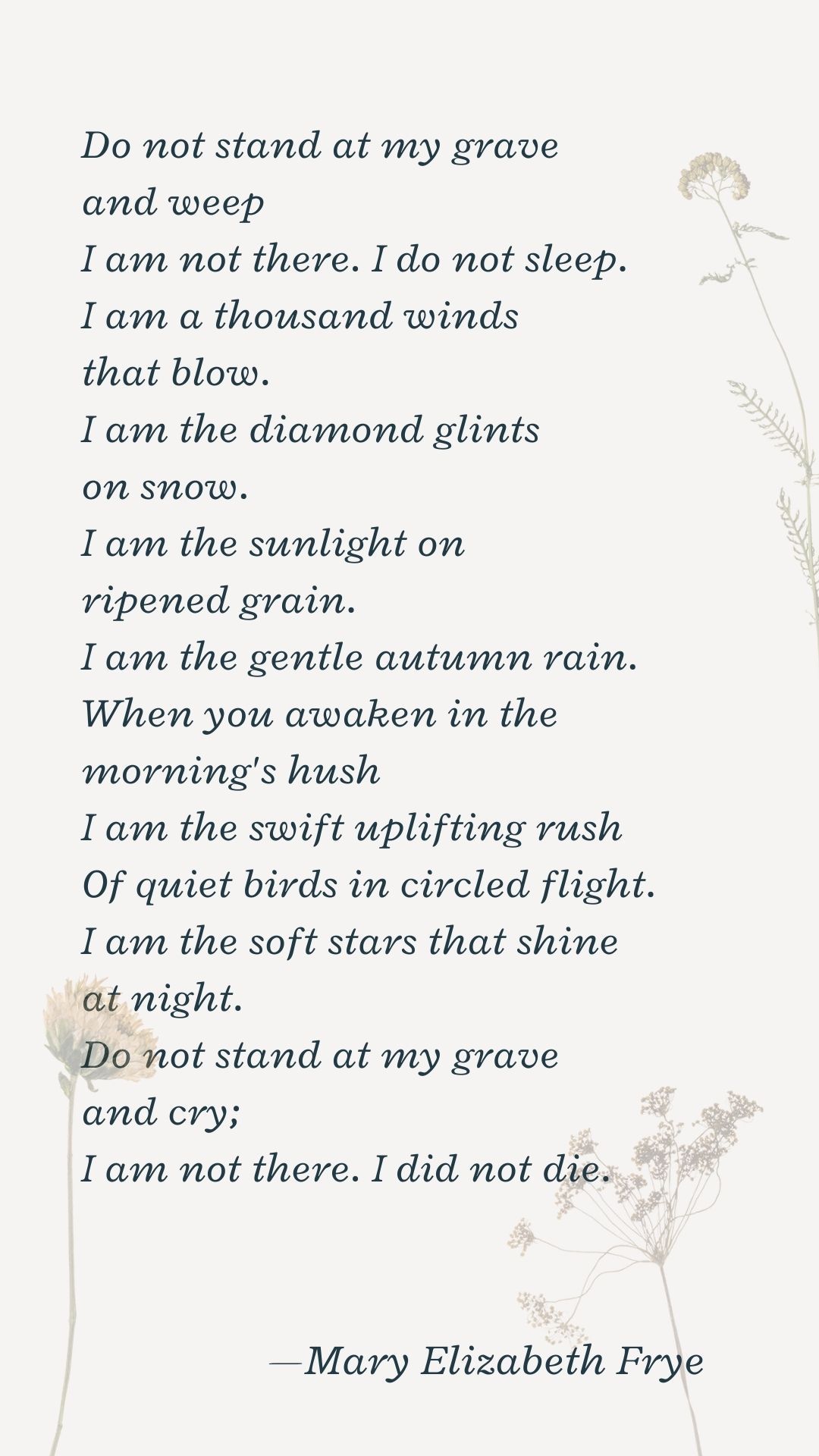7 Uplifting Funeral Poems to Read at a Service
When planning a funeral or memorial service, choosing the right words can be one of the most challenging tasks. Poetry often helps us express emotions that are difficult to put into words, offering comfort, reflection, and a sense of peace.
Why People Choose to Read Uplifting Poems at Funerals
Poems can be moving, and reading one at a funeral can be a powerful way to honor the life of a loved one. Poems often capture complex emotions and thoughts in a way that resonates deeply with those who are grieving. They offer a means to express feelings of loss, love, and remembrance, providing comfort to both the speaker and the listeners. The rhythm and flow of a well-chosen poem can bring a sense of peace to a somber occasion, helping to celebrate the life of the deceased while also offering hope and solace to those left behind.
A few famous funeral poems are often chosen for funeral and memorial services because of their ability to convey deep emotions, provide comfort, and offer a sense of peace during a time of loss. These poems capture the essence of love, remembrance, and the enduring bond between the living and the departed.
1. “Do Not Stand at My Grave and Weep” by Mary Elizabeth Frye
This poem is a timeless favorite for funerals, offering a message of comfort and reassurance. It reminds us that our loved ones never truly leave us but remain present in the world around us—”in the wind, the rain, and the quiet of the morning.” Frye’s words help mourners focus on the continuity of life rather than the finality of death.
“Do not stand at my grave and weep.
I am not there; I do not sleep.
I am a thousand winds that blow;
I am the diamond glints on snow.
I am the sunlight on ripened grain;
I am the gentle autumn’s rain.
Do not stand at my grave and mourn.
I am the dew-flecked grass at dawn.
Where tranquil oceans meet the land
I am the footprints in the sand
To guide you through the weary day.
I am still here; I’ll always stay.
When you wake up to morning’s hush
I am the swift uplifting rush
Of quiet birds in circled flight.
I am the stars that shine at night.
Do not stand at my grave and cry.
I am not there; I did not die.”
2. “Gone From My Sight” by Henry Van Dyke
Often referred to as “The Parable of Immortality,” this poem uses the metaphor of a ship disappearing over the horizon to represent death. It beautifully conveys the idea that while we can no longer see our loved ones, they have simply moved to a place beyond our view—a place where they continue to exist.
“I am standing upon the seashore. A ship, at my side,
spreads her white sails to the moving breeze and starts
for the blue ocean. She is an object of beauty and strength.
I stand and watch her until, at length, she hangs like a speck
of white cloud just where the sea and sky come to mingle with each other.
Then, someone at my side says, “There, she is gone.”
Gone where?
Gone from my sight. That is all. She is just as large in mast,
hull and spar as she was when she left my side.
And, she is just as able to bear her load of living freight to her destined port.
Her diminished size is in me — not in her.
And, just at the moment when someone says, “There, she is gone,”
there are other eyes watching her coming, and other voices
ready to take up the glad shout, “Here she comes!”
And that is dying…”
3. “The Parting Glass” (Traditional Irish)
“The Parting Glass” is a traditional Irish poem and song often sung at the end of gatherings. It celebrates the life and legacy of the deceased while acknowledging the sadness of their passing. The poem is a beautiful way to say farewell, emphasizing gratitude for the time shared with the loved one.
“Of all the money that e’er I had
I spent it in good company
And all the harm I’ve ever done
Alas it was to none but me
And all I’ve done for want of wit
To mem’ry now I can’t recall
So fill to me the parting glass
Good night and joy be to you all
So fill to me the parting glass
And drink a health whate’er befall,
And gently rise and softly call
Good night and joy be to you all
Of all the comrades that e’er I had
They’re sorry for my going away
And all the sweethearts that e’er I had
They’d wish me one more day to stay
But since it falls unto my lot
That I should rise and you should not
I gently rise and softly call
Good night and joy be to you all
If I had money enough to spend
And leisure time to sit awhile
There is a fair maid in this town
That sorely has my heart beguiled.
Her rosy cheeks and ruby lips
I own she has my heart in thrall
Then fill to me the parting glass
Good night and joy be with you all.
A man may drink and not be drunk
A man may fight and not be slain
A man may court a pretty girl
And perhaps be welcomed back again
But since it has so ought to be
By a time to rise and a time to fall
Come fill to me the parting glass
Good night and joy be with you all
Good night and joy be with you all”
4. “Remember” by Christina Rossetti
Rossetti’s “Remember” is a gentle poem that encourages loved ones to remember the deceased fondly, but not to be consumed by grief. It reflects on the importance of moving forward while holding the memory of the loved one close to the heart.
“Remember me when I am gone away,
Gone far away into the silent land;
When you can no more hold me by the hand,
Nor I half turn to go yet turning stay.
Remember me when no more day by day
You tell me of our future that you plann’d:
Only remember me; you understand
It will be late to counsel then or pray.
Yet if you should forget me for a while
And afterwards remember, do not grieve:
For if the darkness and corruption leave
A vestige of the thoughts that once I had,
Better by far you should forget and smile
Than that you should remember and be sad.”
5. “She Is Gone” by David Harkins
This poem is often chosen for its uplifting tone, offering comfort by focusing on the positive memories of the deceased. Harkins’ words encourage mourners to find strength in the love and joy shared with the departed, rather than being overwhelmed by their absence.
“You can shed tears that she is gone
Or you can smile because she has lived.
You can close your eyes and pray that she will come back
Or you can open your eyes and see all that she has left.
Your heart can be empty because you can’t see her
Or you can be full of the love that you shared.
You can turn your back on tomorrow and live yesterday
Or you can be happy for tomorrow because of yesterday.
You can remember her and only that she is gone
Or you can cherish her memory and let it live on.
You can cry and close your mind, be empty and turn your back
Or you can do what she would want: smile, open your eyes, love and go on.”
6. “To Those Whom I Love and Those Who Love Me” (Author Unknown)
This simple yet profound poem is a heartfelt message from the deceased to those they have left behind. It reassures loved ones that the bond they shared transcends death, and that they should find peace in the memories and love that remain.
“When I am gone, release me, let me go
I have so many things to see and do.
You mustn’t tie yourself to me with tears,
Be happy that we had so many years.
I have you my love, you can only guess
How much you gave to me in happiness.
I thank you for the love you each have shown
But now it’s time I traveled on alone.
So grieve awhile, for me, if grieve you must
Then let your grief be comforted by trust.
It’s only for awhile that we must part
So bless the memories within your heart.
I won’t be far away, for life goes on
So if you need me, call and I will come.
Though you can’t see or touch me, I’ll be near
And if you listen with your heart, you’ll hear
All of my love around you soft and clear.
And then, when you must come this way alone
I’ll greet you with a smile and say
“Welcome Home.””
7. “Crossing the Bar” by Alfred, Lord Tennyson
Tennyson’s “Crossing the Bar” is often chosen for its peaceful depiction of death as a journey to another shore. The poem conveys a sense of calm acceptance and hope, making it a comforting choice for a funeral. It’s a reminder that death is not an end, but a transition.
“Sunset and evening star,
And one clear call for me!
And may there be no moaning of the bar,
When I put out to sea,
But such a tide as moving seems asleep,
Too full for sound and foam,
When that which drew from out the boundless deep
Turns again home.
Twilight and evening bell,
And after that the dark!
And may there be no sadness of farewell,
When I embark;
For tho’ from out our bourne of Time and Place
The flood may bear me far,
I hope to see my Pilot face to face
When I have crost the bar.”
These seven poems offer different perspectives on loss and remembrance, but all share a common thread of uplifting those who hear them. By choosing one of these poems for a funeral, you can help provide comfort and solace to those mourning, while also celebrating the life and legacy of the loved one who has passed. Whether you seek words of hope, reassurance, or peaceful acceptance, these poems can help guide you through one of life’s most challenging moments.
When and Where Should Uplifting Funeral Poems Be Used?
Here are eight different ways to incorporate poems into a funeral or memorial services:
1. During the Eulogy
One of the most common times to read a funeral poem is during the eulogy. A carefully chosen poem can complement the eulogy by encapsulating the emotions of the moment, providing a poetic summary of the deceased’s life, or offering comfort to the grieving. The poem can either begin or conclude the eulogy, setting the tone or providing a poignant ending.
2. As a Standalone Reading
Funeral poems can be read as standalone pieces during the service. This might be done by a family member, close friend, or even the officiant. A poem can be introduced to offer a moment of reflection, giving attendees time to process their emotions in a structured and meaningful way.
3. During the Opening or Closing of the Service
Starting or ending the service with a poem can create a powerful bookend to the proceedings. An opening poem can set a reflective tone, helping everyone settle into the moment, while a closing poem can provide a sense of closure and peace as the service concludes.
4. During a Candle Lighting or Symbolic Ritual
If the funeral includes candle lighting or another symbolic ritual, such as releasing doves or scattering ashes, a poem can be read to accompany the act. This adds a layer of meaning to the ritual, tying the symbolic gesture to the words of the poem and the memory of the loved one.
5. At a Graveside Service
Poems are also fitting for graveside services, where the intimate setting often calls for words that are both comforting and profound. A poem can be read before the final words are spoken or during the act of lowering the casket or scattering ashes, providing a moment of shared reflection.
6. In Printed Memorial Programs
Including a funeral poem in the printed memorial program allows attendees to take the words with them as a keepsake. The poem can be a reminder of the sentiments expressed during the service and can provide ongoing comfort in the days and weeks following the funeral.
7. As Part of a Video Tribute or Slideshow
If the service includes a video tribute or slideshow, a poem can be incorporated as part of the visual presentation. The words of the poem can either be displayed on the screen or read aloud as the images of the loved one are shown, adding a layer of emotional depth to the tribute.
8. During a Memorial Gathering or Wake
For less formal gatherings, such as a wake or memorial reception, reading a poem can be a meaningful way to pause and reflect during the event. This can be done at the beginning, before meals, or at a designated time when guests are invited to share memories and stories.
Tharp Funeral Home Can Help
At Tharp Funeral Home, we understand how difficult it can be to find the right words during times of grief. Our compassionate staff is here to support you every step of the way, helping you create a meaningful and heartfelt service that honors your loved one’s life. Whether you need assistance choosing readings, organizing the service, or simply need someone to talk to, we are here for you in this challenging time. Contact Tharp Funeral Home Today.








